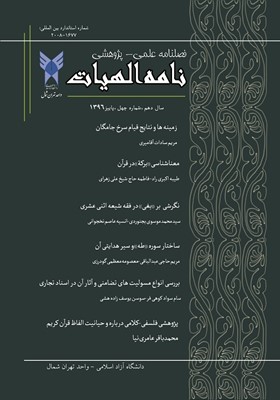The main methods of "strategic influence" of the enemy in the religious system From the perspective of Quranic teachings - narration
Subject Areas : Nameh ElahiyatMahdi Gorji Azandariani 1 , Maryam Haji Abd Al-Baqi 2 * , Mahdi Eizadi 3 , Muhammad Hadi Homayun 4
1 - PhD student in Quranic and Hadith Sciences, Islamic Azad University, North Tehran Branch
2 - Faculty member of Islamic Azad University, North Tehran Branch
3 - Faculty member of Imam Sadegh University
4 - Faculty member of Imam Sadegh University
Keywords: Methodology, enemy, Strategic influence, religious system, Quranic-narration, cognitive warfare,
Abstract :
The historical conflict between the right front and the wrong front has been formed since the beginning of human presence. On the one hand, the "divine religion" and on the other hand, the false front, from the system of Satan to the long line of hypocrites, infidels, polytheists, the system of domination, and so on. Although the tools and methods of the enemy have changed in historical periods, its purpose and content have always been the same: the dismantling of the right front in every individual and social form. "Strategic influence" is one of the most important soft threats against the rule of law and the religious system. The present study - which helps the view of updating and functionalizing religious knowledge - identifies the main methods of "strategic influence" of the enemy in the religious system from the perspective of Quranic teachings - narrative. The research is descriptive-analytical in the form of "library method" and based on "ijtihad interpretation" with the tendency of "thematic interpretation" which tries to identify methods, for them comparative equation, Analyze content and conceptualize. Research shows that the enemies in the process of "strategic influence", which is mainly based on cognitive-perceptual warfare, dimensions of vision, attitude, motivation, secretarial and action of the religious system at different levels of structure, leadership, rulers, elites and people. The result of the research indicates that based on the teachings of the Qur'an-narration, the enemies in the direction of "strategic influence" in various and complex ways such as "probable"; "Completion"; "Protection"; "Istehwaz"; "Question"; "Humanity"; "Misguidance"; "Seduction"; "Induction"; "Fright"; "Distortion"; "Decoration"; "Dominance"; "Delivery"; «تضلیل»; "Bribery"; "Development"; "Threat"; "Deception"; "Kid"; "Copper"; "Nazgh"; "Revelation"; "Temptation" and ... use that depending on the conditions, requirements and the target community, sometimes case tactics and in many cases combined methods are used. It is clear that the result of such an attack will be "strategic deception" and "transformation of the religious system from within."
_||_

